
Pinar Yolacan, "Untitled (PYM4.22)," 2007, C-print, 40" x 30", edition of 6. Courtesy the Artist (via Rivington Arms).
Last year’s group exhibition Meat After Meat Joy at Daneyal Mahmood Gallery left a lasting impression on me — I still can’t shake the suffocating, putrid smell of rotting meat. As a vegetarian, I suppose my preexisting sensitivity to the content played a role in that. Be that as it may, the exhibition (a truly good show) has made me especially cognizant of all things meat this year, and there were quite a few of them. Here’s a look back at some meaty moments in 2009:
Dressed with Kill
Whereas Pinar Yolacan’s work could easily have gone unnoticed in the aforementioned exhibition, her presence was felt this year in Dress Codes, the third triennial of the International Center of Photography. Her portraits of Afro-Brazilian women were highlights of an all around impressive installation of photographs and video. Stitching together sumptuous velvets and silks with slimy gizzards and chunks of animal protein, her costumes appeared to drip from and restrain her sitters. Vile and picturesque, slaughtered and oddly seamless, her compositions give new meaning to “raw beauty.”

"Spiral Jetty Burger," The Laundromat Gallery, 2009. Caption: "Sadly, the Robert Smithson, by Jonathan Allmaier was less Spiral Jetty and more Paul McCarthy meets Andres Serrano. It was, nonetheless, very good.” Courtesy C-Monster.net.
Burgers en Masse
Epicurious predicts that burgers will be on the back burner in 2010, though they were haute (in art) in 2009. In August, C-Monster (once a guest blogger of Art21) captured The ‘Burger’ Group Show at The Laundromat Gallery. For this conceptual cookout artists grilled homages to Roberts Smithson and Motherwell; a high-rising whopper for Rachel Harrison; and a couple of Spanish masterpieces (with blue cheese) among other beefy works. I can’t say I would have partaken in this eat-zibit, but after scrolling through these masterful creations, seitan looked awfully boring.

Bruce High Quality Foundation, "Die Burger" (detail), 2009. Courtesy Eat Me Daily. Photo: Elizabeth Jones/Eat Me Daily.
At Art Basel Miami Beach, Eat Me Daily caught wind of the Bruce High Quality Foundation installation Die Burger: a modified video of Warhol eating sliders, and a display of Beuysian mac multiples with meat patties made of felt, cheese slices of lard, and real Burger King buns. On that note:
Burgers Can Kill You
After six years of research and filming, in June, Robert Kenner and Eric Schlosser slapped audiences with Food, Inc., a 94-minute glimpse into the American food industry that, for a moment, made me seriously ponder the benefits of anorexia. The story of Barbara Kowalcyk, whose 2-year-old son suffered and then died from E.coli poisoning after eating a hamburger from a fast-food joint, drove home the consequences of often unsanitary, and softly regulated practices in factory farming and like operations. And yet, this month, reports state that an E.coli vaccine is now being tested on cattle (a questionable patch for a larger problem); the U.S. Food and Drug Administration has been petitioned to ban the use of arsenic-compounds in animal feed (what?!); and fast-food outlets have higher standards for meat than the National School Lunch program (maddening).
Food Inc.: A Participant Guide: How Industrial Food Is Making Us Sicker, Fatter, and Poorer—And What You Can Do About It, a companion book to the film, was released in May. And six months later, Jonathan Safran Foer published his book Eating Animals, which also goes behind the scenes of the meat industry. Foer continues to receive mixed reviews from critics — some of whom, I gather, have grown tired of food writers and activists sullying their next juicy meal. Lucky for them, this year also saw the release of Nora Ephron’s light-hearted film Julie & Julia, in which the deboning of a duck was unusually charming, and Boeuf Bourguignon all but jumped off the screen and into your mouth. Yes, for some, meat remains glorious.
Down to the Bone
For the opening gala of the New York City performance biennial, Performa09, Jennifer Rubell organized an edible display of barbecued pork ribs — 2,000 pounds to be exact — from Daisy May’s BBQ. Soaked with honey dripping from the ceiling above, slabs of flesh and bone have never looked better (except in the hands of the ladies pictured below). Andrew Russeth of Artinfo.com and the blog 16 Miles of String beautifully described this night of gastronomic ecstasy:
Two thousand pounds of barbecued pork ribs pack a strong, relentlessly wonderful smell. Well before dinnertime, their fat, spicy scent had easily wafted out of the dining room and into the stairwell, teasing visitors with almost unimaginable deliciousness. However, entering the banquet hall and seeing an actual ton of meat piled on a white pedestal was frankly horrifying. Even the most unrepentant carnivores had to admit: That was a lot of dead pigs. Thankfully, the sweet, crispy skin and the succulent, fatty meat…quickly banished any feelings of guilt…Overhead, thin streams of honey dripped from an overhead platform, resembling glimmering, golden versions of Fred Sandback strings, through which people waved their plates. The pools of honey and the intensely rich sauce made for a profoundly sticky eating experience…
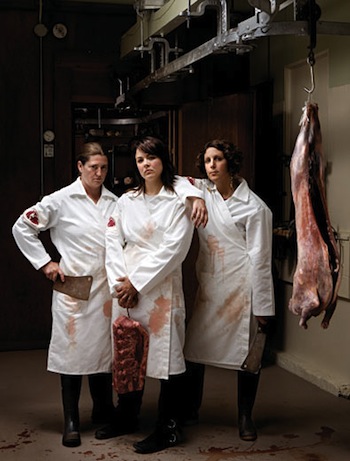
Julio Duffoo, San Francisco butchers featured in Meatpaper, 2007. Courtesy the artist and Meatpaper.
In July, the New York Times article “Young Idols With Cleavers Rule the Stage” confirmed that we are “in the middle of a total meat obsession.” Given the increased demand for people who know how to “extract short ribs from a side of beef or pork belly from a hog,” young butchers, covered with blood and armed with sharp objects, have become the new rock stars of the food scene. (Could this be an extension of the vampire craze?) Around the time of this article, the art and culture journal Meatpaper organized their first exhibition at the grocery store-affiliated cultural space, 18 Reasons, showing Julio Duffoo’s color-rich photographs of people who work in slaughter and butcher industries, including this brazen trio with carcass and cleavers in hand. Sexy. Scary.
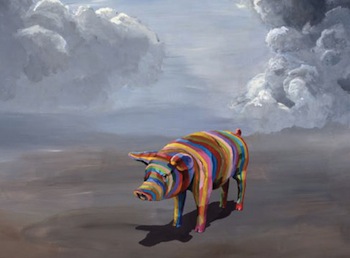
Djordje Ozbolt, "Last Year's Fashion," 2008. Acrylic on canvas, 58 5/8" x 58 5/8". Courtesy 303 Gallery.
Bring on the Bacon
Pigs had more than their 15 minutes of fame in 2009. A team of Dutch scientists came close to realizing in vitro meat, made by culturing pig stem cells and growing muscle in a petri dish. (This came in at number 36 in Time Magazine‘s list of the 50 best inventions in 2009.) But this news paled in comparison to H1N1 influenza virus, also known as “swine flu,” which began to unfold in April as the biggest pig story/panic of the decade. Meatpaper was (perhaps unknowingly) a step ahead when they released The Pig Issue in March, with a multicolored oinker painted by London-based artist Djordje Ozbolt on the cover. The issue included, among other things, a comparison of a county fair sow and Miss America, chefs’ pig tattoos, and the results of a fake bacon taste test (ick).
You might say it was a break-out year for bacon, as entire exhibitions were dedicated to the crispy cuts. The Bacon Show at Mew Gallery in Philadelphia (their final show before closing for good) celebrated the raw and cooked meat in “all its sizzling, savory goodness” through works by artists such as Ellen Cagnassola, Cho, Jacob Crose, Mike Geno, Ken B. Miller, SappyMoose Tree, and John Wolfer. The Metropolitan Museum of Art caught on too, showing bacon of another kind.
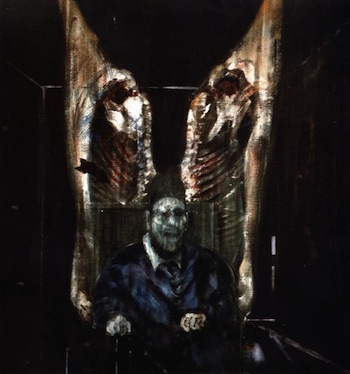
Francis Bacon, “Figure with Meat”, 1954. Oil on canvas, 51 1/8" x 48", © 2008 Estate of Francis Bacon/Artists Rights Society. (ARS), New York/DACS, London. Courtesy The Art institute of Chicago.
Francis Bacon: A Centenary Retrospective — consisting of 130 works that spanned the entirety of the artist’s career — recently received the International Association of Art Critics/USA award for Best Monographic Museum Show in New York City this year. Somehow, sadly, I didn’t make it to this exhibition, which sounded heavy on meat and emotion. Jerry Saltz (of Artnet.com and New York Magazine) wrote of the exhibition:
[Bacon’s] early accomplishments are undeniable … especially the signature paintings of the ‘40s and ‘50s: Canvases with twisted masses of faceless flesh and otherworldly homunculi, creatures of the id posed in living-room wastelands and Stygian prisons. The best of this work shrouds you in a sulfuric gloom where strange powers transform human souls into delirious monsters.
Saltz also noted that Bacon “may be the only artist sharing a name with one of his main subjects.”
And finally, my favorite bacon bit of the year was this smokin’ hot bra, which made its original debut in 2008, and came back to titillate eyes when Bust Magazine borrowed the image and informed its blog readers that bacon is the new cupcake. That’s right, ladies: Carrie Bradshaw and her friends are out (once and for all, I hope), while Carolee Schneeman remains timeless.
Now, tell me, what did I miss?

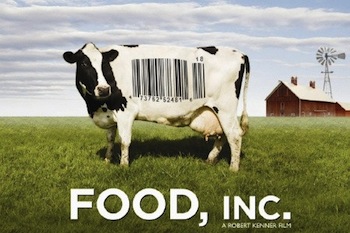
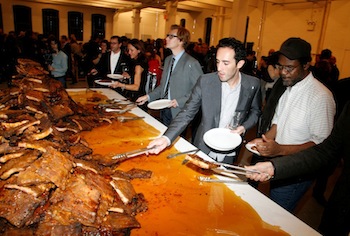
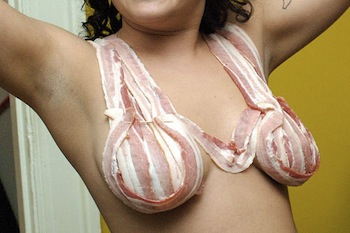



Pingback: Gastro-Vision: In the Land of Plenty | Art21 Blog
Pingback: Gastro-Vision | It Was a Sweet Year | Art21 Blog